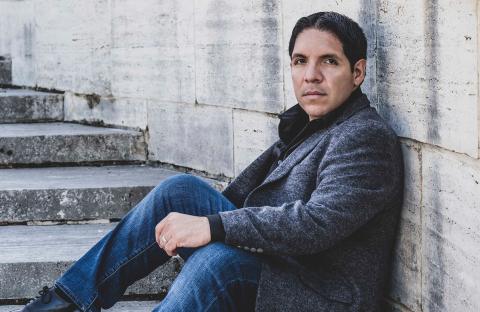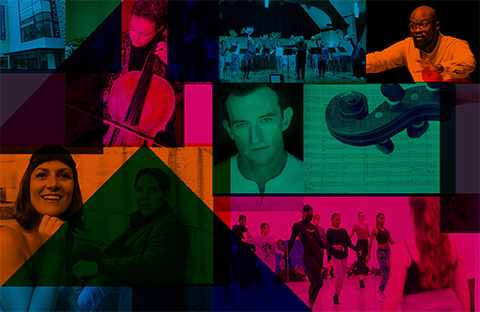Q&A with Chair Of Voice Isaí Jess Muñoz

Isaí Jess Muñoz joined Boston Conservatory at Berklee in August 2022 as chair of voice, overseeing and supporting faculty and students in the school’s voice, opera, vocal pedagogy, and choral programs and leading curricular change aligned with Boston Conservatory’s Strategic Direction. An acclaimed tenor who has collaborated with some of the world’s leading ensembles, he recently released Visca L’Amor: Catalan Art Songs of the XX and XXI Centuries, which reflects his deep commitment to elevating underrepresented musical voices.
When did you know that you wanted to pursue classical music as a profession?
I first realized I wanted to pursue formal studies in classical music at an early age. My childhood was filled with a beautiful and rich cultural heritage of tastes and sounds from Latin America, folkloric and popular in scope. It wasn’t until Orlando Opera, a local opera company, visited my grade school that I heard live the ethereal sounds of classical singing. Once I listened to the unmistakable sounds of opera, in the fifth grade to be exact, I was hooked! I ran home to tell my parents that I wanted to be an opera singer. Three months later, I was in my first mainstage opera—Puccini’s Tosca—standing behind Sherrill Milnes’s Scarpia as a child chorister in the opera’s act one finale, “Te Deum.” I stayed on in the youth program of Orlando Opera, which then prepared me for college auditions. The rest of my trajectory is simply about hard work and people helping people. You can say I’m in large part a product of arts outreach programs, which is something that I do my best to advocate for in my role today as an artist and educator. You never know who’s sitting out there in the audience, whose life you’re changing.
Talk about some of the key mentors who were pivotal along your career path. What did you learn from them?
My first voice teacher and closest mentor for nearly 25 years was the late Richard Owens. He was a true pioneer who founded the American Institute of Musical Studies (known as AIMS) in Graz, Austria, which was the first and now largest program of its kind, originally aimed to train American singers in the European system. Professor Owens changed the face of training for performers, and though there is more I could say in recognizing his artistry and visionary prowess, perhaps the most important thing to point out is the high moral character he maintained in all his interactions. I learned so much from my studies with him, and later from assisting him with the building of training models that have now been emulated by dozens of universities, conservatories, and professional training programs in America and abroad.
Other mentors include Sylvia Plyler, who for many years served on the coaching faculty at Aspen and the University of Cincinnati College-Conservatory, where I studied. I then pursued my master’s degree at the Manhattan School of Music, where Gordon Ostrowski (dean of opera emeritus) introduced me to the National Opera Association (NOA), leaving an indelible impact on my life. I’m honored to currently serve as NOA’s president-elect, where I get to continue the legacy passed on by some of my mentors, which involves regularly curating and producing performances and lectures for national conferences and centers for music and learning. Every day, getting to disseminate not only my own work but also the work of my peers for the betterment of communities is something that fills me with great joy. It also leaves me with a deep sense of gratitude to know that music in many ways chose me.
In your singing career, you have a clear passion for performing works by underrepresented peoples and cultures. What draws you to this work?
One of the pervasive challenges in higher music education is that still today, very little scholarly attention is devoted to the history and analysis of music outside North American and Central European music (from which Spain is also regularly excluded).
Early in my career, I performed detailed exploratory fieldwork in Iberian and Latin American classical song. Preliminary research had sent me to Barcelona, where I visited various archives and library collections that led me to engagement with the art songs of Catalonia, the autonomous community in Spain, where the repressive effects of the Spanish Civil War and Francisco Franco’s dictatorial ban on its native language—Catalan—contributed to scarce diffusion of all its literature, including its canon of classical song. I quickly began to explore more underrepresented material often associated with Iberian and Latin American cultures that have been suppressed and marginalized. Each region offers its own distinctive musical voice, rich in abstract harmonies, provocative and intimate and nostalgic. Often, inherent in the music of these cultures is a search for national identity—a yearning that is explored through musical and poetic colors—emerging from the human compulsions to contemplate and to record. My hope is that, beyond the sharing of beautiful music, the narratives covered in my past and future projects, regardless of whether they focus on obscure or well-known material, serve in some way to promote inclusion, awareness, and a positive difference.
What are some of your top priorities in your role as chair of voice?
One of my primary goals is to continue building upon the Conservatory’s deep commitment to fostering spaces where people feel a sense of belonging—where our community members share purposeful work that promotes a common life together. I’m therefore always thinking of how individual creative ventures relate to our collective body of work. We’re educators and learners in a world of rapid and incalculable change, which has great implications for our efforts to build community in higher education environments.
By leveraging our collective strengths, we will continue finding new and exciting ways to keep the curriculum and offerings relevant. With a faculty of international renown, a stealthy annual lineup of important visiting artists, and a strong commitment to civic engagement and global initiatives, the department has entered a time where we can now go from strength to strength. I have many ideas, but together the faculty and I will continue building on the rich history of our department that has been mentoring young artists very successfully now for more than 100 years. It’s an incredible legacy.
So far, what have you enjoyed most about Boston Conservatory?
We not only teach our students how to sing, act, and dance; we mentor them on how to thrive in an ever-changing world and marketplace. Many things are continually changing and always renewing themselves. Every day, Boston Conservatory accomplishes the extraordinary task of meeting the needs of its community and the evolving music industry at large through its very relevant curriculum and the myriad windows of possibility that open on our campus every day.
But beyond all the excellent teaching and networking opportunities at our fingertips, it’s the genuine sense of goodness and familial inspiration felt in our hallways that excites me to come to work every day. There is an ethic of care here at Boston Conservatory that is distinct. We’re championing people’s goals and aspirations in ways where they feel creative, safe, powerful, and courageous. Our students and faculty understand that they have an opportunity to build a life for themselves through the performing arts that has purpose, meaning, and the power to actually change the world.
The music industry branches out beyond entertainment in so many ways—in education, certainly, but also in the health sciences, in technology, and through other avenues. “How can you change the world through your journey in singing and creating?” That’s a question we ask ourselves here continually. Yes, we’re recognized as one of the premier training programs for opera in America, and we’re now leading the way in all things vocal pedagogy. We’re also experimenting with new and existing approaches in ways unlike any other training program in the world. Our choral ensembles and current song literature experiences are at the heart of these kinds of unique explorations. Boston Conservatory is an exciting place to be!
Learn more about the Conservatory’s leading voice and opera programs.
READ: STAGES 2022–2023

“Q&A with Chair Of Voice Isaí Jess Muñoz" first appeared in the 2022–2023 issue of STAGES, Boston Conservatory's annual magazine.
